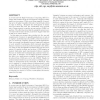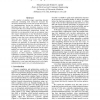44 search results - page 6 / 9 » Gang Scheduling with Memory Considerations |
IEEEHPCS
2010
13 years 5 months ago
2010
Stream languages explicitly describe fork-join parallelism and pipelines, offering a powerful programming model for many-core Multi-Processor Systems on Chip (MPSoC). In an embedd...
JSAT
2008
13 years 7 months ago
2008
In this article we describe and evaluate optimized compact data structures for watching literals. Experiments with our SAT solver PicoSAT show that this low-level optimization not...
SIGMETRICS
2011
ACM
13 years 2 months ago
2011
ACM
In recent years the High Performance Computing (HPC) industry has benefited from the development of higher density multi-core processors. With recent chips capable of executing u...
HPCA
2008
IEEE
14 years 7 months ago
2008
IEEE
Simultaneous Multithreading (SMT) attempts to keep a dynamically scheduled processor's resources busy with work from multiple independent threads. Threads with longlatency st...
ISCA
2002
IEEE
14 years 13 days ago
2002
IEEE
The number of pipeline stages separating dynamic instruction scheduling from instruction execution has increased considerably in recent out-of-order microprocessor implementations...


